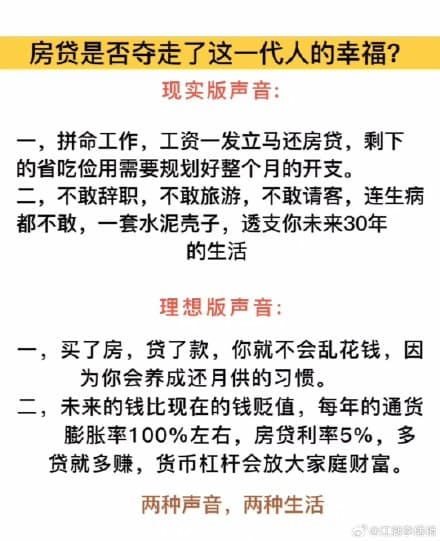The Debate Over Housing Prices in China: Prosperity or Suffering?
Title: The Debate over Housing Prices in China: Prosperity or Suffering?

10 January 2024
Introduction
Recently, a discussion has arisen on Chinese social media platform, Weibo, regarding housing prices in the country. The conversation was sparked by Professor Ruan Jia, who spoke at the 2023 "Annual Financial Thought Leader" Ceremony held by the first financial number of the Chinese first economy. The professor's statement that housing prices are more beneficial to the public and that a drop in prices would cause significant losses was met with both agreement and opposition from netizens. This article will delve into the different perspectives and reactions of Weibo users to this issue.
The Context of the Debate
In Professor Ruan's speech, he referred to the People's Bank of China's report on the 2019 survey of Chinese urban residents' family assets and liabilities. The report showed that the average housing assets of a Chinese family account for 59% of their total assets, which amount to approximately 1870000 yuan. If housing prices were to drop dramatically, it would have a significant impact on the average household.
This concern is not unfounded, as A-share market value now exceeds 40% of the real estate sector's direct or indirect contribution. Household mortgage loans alone exceed 50 trillion yuan, with property sales closely linked to the sales of home appliances. History has shown that when both house prices and stock prices decline simultaneously, no economy has ever experienced sustained growth.
Netizen Reactions
With the issue of housing prices taking center stage on Weibo, netizens began to express their opinions on the matter, with some agreeing with Professor Ruan's views and others voicing opposition.
Netizen Reaction 1: The Losses from Housing Prices Falling Are Felt by Homeowners
A Weibo user shared their perspective, stating that those who would suffer the most from a drop in housing prices were homeowners with multiple properties and those who engaged in real estate speculation. The average homeowner, with just one residence, would not be significantly impacted by a decline in housing prices.
Netizen Reaction 2: The Pain of Rising Housing Prices and the Struggles of Everyday Life
Another Weibo user pointed out that as housing prices increase, more and more people become enslaved by these "concrete shells." They argue that increasing prices lead to a reduction in living standards, with individuals unable to quit their jobs, take vacations, or even have enough money to cover unexpected medical expenses.
Netizen Reaction 3: A Lack of Affordable Housing Options
Some Weibo users criticized the government's efforts to control housing prices, arguing that the measures taken during financial crises only provided temporary relief without addressing the underlying issue of a lack of affordable housing options.
In contrast, some netizens supported Professor Ruan's views, agreeing that declining housing prices could have negative economic consequences. They believed that sustained economic growth is closely tied to rising housing prices and the overall stability of the real estate market.
Conclusion
The debate over housing prices in China highlights the complex nature of this issue and its implications for the country's economy and society as a whole. While some argue that rising housing prices are necessary for economic stability and prosperity, others believe that affordable housing should be a priority to ensure that ordinary citizens are not priced out of the market. Regardless of the opinions expressed on Weibo, it is clear that the ongoing conversation surrounding housing prices in China will continue to shape public policy and the future of the nation's real estate market.
Share this article
Related Articles

Mother’s Hand‑Stitched Nike Backpack Goes Viral, Showcasing Love, Craftsmanship and Brand Authenticity in China
By Trending on Weibo
Culture
15 Sept 2025

China’s “National Treasure Highlights” Campaign Turns Heritage Into Global Soft‑Power and Consumer Brand】
By Trending on Weibo
Culture
13 Sept 2025

Mystery Meme: Unraveling China’s “Dissected 14 People, Crumbled by a Letter” Phenomenon】
By Trending on Weibo
Culture
8 Sept 2025

Chinese Netizens Turn Blood Moon Into Viral “Too Abstract” Meme
By Trending on Weibo
Culture
8 Sept 2025

From Song Dynasty Verse to 2024 Drama: The Enduring Echo of “Rain‑Laden Bells” in Chinese Culture
By Trending on Weibo
Culture
8 Sept 2025